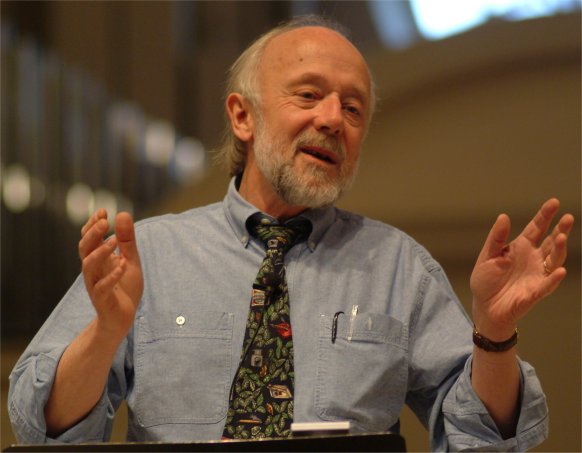A well-known universalist would be Marcus Borg.

He is a member of the Jesus Seminar. The Jesus Seminar, according to Wikipedia, determined whether or not what in the bible is relevant today:
One of the most active groups in biblical criticism, the seminar uses votes with colored beads to decide their collective view of the historicity of Jesus, specifically what he may or may not have said and done as a historical figure.
The Fellows used a "bead system" to vote on the authenticity of about 500 statements and events. The color of the bead represented how sure the Fellow was that a saying or act was or was not authentic.
Red beads – indicated the voter believed Jesus did say the passage quoted, or something very much like the passage. (3 Points)
Pink beads – indicated the voter believed Jesus probably said something like the passage. (2 Points)
Grey beads – indicated the voter believed Jesus did not say the passage, but it contains Jesus' ideas. (1 Point)
Black beads – indicated the voter believed Jesus did not say the passage—it comes from later admirers or a different tradition. (0 Points)
He was also the formentor of the God at 2000 conference and the Jesus at 2000 symposium.
He is but one among many in our day, having grown up a Lutheran and then realizing a new way to think about God sometime after joining the episcopal church. There are others who have taken different paths, but all having ended up in "relatively" the same place. A short sample of Borg's universalist beliefs:
On pluralism
On creeds
I have had a brief conversation with Borg.
If you follow the "God at 2000" link above you will notice it took place in Oregon, at OSU (my alma mater) when I was a student. On paper he was the professor for one class I took called "The Philosophy of Religion," though he did not teach the class personally. One day he came into class unannounced, so that he could answer students' questions.
Well, I was 20 years old at the time and I knew a total of maybe ten scriptures out of the entire bible. But I needed to quote it, so I exited the classroom and ran full-blast back to my place on campus, then back.
I asked him with heaviness, "You have written so many books on what you think it means to be religious, and on who God is. I want to ask you, aren't you scared?"
"Huh? What do you mean?" he asked.
"What I mean is, there are so many people who are reading them. They may begin to think about God the way you have written. But what happens if maybe you missed something important? And I have reason to think that is the case. Because it says here... in hebrews 11:6 that without faith it is impossible to please God. And then it says... in 1 cor. 1:18
'For the message of the cross is foolishness to those who are perishing, but to us who are being saved it is the power of God.'
and it says
'It is foolish to the Jews, who ask for signs from heaven. And it is foolish to the Greeks, who seek human wisdom. So when we preach that Christ was crucified, the Jews are offended and the Gentiles say it’s all nonsense. But to those called by God to salvation, both Jews and Gentiles, Christ is the power of God and the wisdom of God.'"
He said, "I don't know what you're intending to ask after all of this."
I replied, "Shouldn't these things make it clear how God accepts us? But, you don't interpret these passages this way, right?"
And he answered, "No," [pause] "I do not."
That was it.
I was literally dancing in my seat. I was also immature and arrogant. Either then with no biblical background, or now, I would still give that same answer to any universalist point of view: neither salvation or relationship with God is possible except through faith in Jesus Christ alone.
There is only one God, and only one Way. The neglect of such framework equates there to be no such thing as an absolute knowledge of the Abrahamic God.
What is said? "Universalist."
What is meant? "More liberal... compared to me."

No comments:
Post a Comment